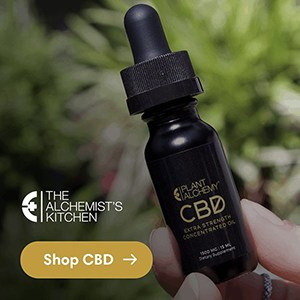There is a groundswell of interest in microdosing plants, herbs, and mushrooms. Although microdosing is generally associated with using psychedelics in low dosages, the interest is rapidly expanding to include non-psychoactive cannabinoids extracted from the Cannabis plant and medicinal mushrooms such as Lions Mane, Reishi, and Cordyceps.
Using high-potency concentrated tinctures at a higher dosage may deliver faster relief from stress, anxiety, brain fog, and pain. Let’s discover more of the benefits of microdosing together.
A Brief History
Although microdosing has only recently become popular, the practice has a long history. Microdosing has existed in many indigenous cultures around the world. This spiritual process has been used as an ally for healing, social engagement within the family, and tribal governance.
The highly influential philosopher and author Terence McKenna, presented his “stoned ape theory” in his book,
“Food of the Gods”, hypothesizing that ancestral apes living in trees munched on psychoactive mushrooms growing in the grasslands and forests. This behavior stimulated mental awareness and helped them adapt.
Many indigenous cultures are led by a shaman, a person who serves as the community’s doctor and spiritual leader. In South America, the curandero is a traditional native healer who carries forth the collective wisdom of the tribal history, sharing stories and presiding over rituals, using psychedelic plants as a channel and guide.
In 1970, Roland Fischer demonstrated that low doses of psilocybin improve cognitive health. His research claims that the incorporation of small doses of psychoactive mushrooms, and cannabis plants into the diet of early humans likely enabled them to live more consciously, increase their knowledge, and advance their culture. This might just be the beginning of the symbiotic relationship between psychoactive plants, mushrooms, and human beings.
The Medical Reality
A large body of anecdotal evidence clearly shows that the benefits of microdosing lead to physical, mental, and emotional improvement. Dr. James Fadiman, a well-respected transpersonal psychologist, has been collecting reports on microdosing from people worldwide since the 1960s. It comes as no surprise that he is often referred to as “The Father of Microdosing”.
What we do know is that psychedelic substances act on the serotonin (5-HT) receptors in our brains.
Serotonin is a chemical messenger or neurotransmitter that delivers messages between nerve cells in the brain and throughout the body. These messages mediate satisfaction, happiness, and optimism. Serotonin levels are reduced in depression, and most modern anti-depressant drugs, known as serotonin reuptake inhibitors (SSRIs), act by increasing the amount of serotonin available to brain cells.
Serotonin receptors are found throughout our nervous system and govern many aspects of our being, including mood, thinking, and sexual desire. Psychedelics bind most effectively to the 5HT-2A receptor, one of the receptors involved in learning, memory, and cognition. As a result, when consuming only a microdose of a psychedelic substance and thus avoiding the “classical trip,” the brain can focus solely on the cognitive boost caused by these receptors.
Microdosing is a practice that yields the best results when it’s done over an extended period following a dosing scheme or protocol. The benefits of microdosing and the results of this practice depend greatly on the person, the substance, the dosage, and many other personal factors, such as one’s intention, expectations, and mindset.
Potential Benefits of Microdosing:
- Improved concentration and focus
- Getting into the flow more quickly—at work, hobby, or study
- Increased creativity
- Increased productivity
- Improved problem-solving capability
- Increased overall awareness
- Improved mood
- More balanced mood
- Better decision-making ability
- Making more conscious choices about health, lifestyle, well-being
- More positive mindset
- Increased emotional awareness

Potential Risks of Microdosing
Microdosing is not for everyone.
Do your research, and consult with your medical professional.
- Microdosing may increase anxiety.
- It may also result in fatigue.
- There is a chance it can cause mild upset stomach and nausea
- Possible connection to causing tinnitus – (ringing in ears)
- May cause headaches
- What we do not know – Everyone is different – Continued research is needed.
Complimentary Microdosing Consultations
Microdosing Integration
Join art therapist Juanita Viera to discover the power of integrating psychedelics into your daily life! Gain artistic knowledge and find the balance through the power of integration. Learn more about this event at our Eventbrite.
Sources:
- Fadiman, J. (2011) The Psychedelic Explorer’s Guide: Safe, Therapeutic, and Sacred Journeys. Park Street Press.
- Fischer, R., Hill, R., Thatcher, K., et al. Psilocybin-induced contraction of nearby visual space. Agents and Actions
- Everything You Wanted To Know About Microdosing (But Were Afraid To Ask). Huffingtonpost.com
- Harman, W. W.; McKim, R. H.; Mogar, R. E.; Fadiman, J.; Stolaroff, M. J. (1966). “Psychedelic agents in creative problem-solving: A pilot study”. Psychological Reports.
- McKenna, T (1992). Food of the Gods: The Search for the Original Tree of Knowledge. Bantam Books (N.Y. et al.).
Disclaimer: The content on this website is for informational and educational purposes only, and does not substitute professional medical advice or consultative with healthcare professionals. If you are seeking medical advice or treatment, we encourage you to consult a medical professional or healthcare provider.







